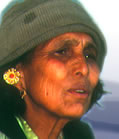THEMES IN THIS
TESTIMONY
Agriculture

Community Activities

Economics

Education

Employment and Income

Family Life

Festivals

Gender

Health

Migration

Click on arrows
to find more
testimonies
featuring
these themes
|
|
Sex
|
female
|
|
|
Age
|
51
|
|
|
Identity
|
N
|
|
|
Occupation
|
farmer
|
|
|
Location
|
Ruchang VDC, Sindhuli
|
|
|
Date
|
February 1994
|
|
summary
A short interview, with some interesting insights into gender relations. The narrator was married by force at the age of 17 - "my brothers dragged and carried me, as if they were giving a chicken." She talks about her daughter’s marriage and regrets that this prevented her daughter continuing with her education. She explains that in the past the old men opposed education for girls – “they used to say that the girls become witches if they are educated... I didn’t get education”.
The narrator makes decisions about farming, but her husband “decides mostly in day to day life”, as well as in the financial matters. Towards the end of the interview she sadly recalls her experience as a woman who did not give birth to a son: “I used to come from the forest after cutting the grass, but there wouldn’t be any food for me. So I used to cry and return holding my khurpa, I feel very sad thinking about it. This is not like city, here you are neglected if you cannot give birth to a son.” It is clear that men are valued more than women, for the local villagers say that “daughters are not equal to sons” and “sons are the seeds of men so one has to try for them”.
detailed breakdown
|
You will need a password from Panos to view the full
transcript of the interview. To apply for a password, click here.
Once you have a password, click here to go to the beginning
of the transcript. You can also click on any section of the
breakdown of content below and go straight to the
corresponding part of the transcript.
|
| Section 1-2 |
Family background
Her children: “I had two whom I could breast-feed and one I couldn't breast-feed, couldn't really take good care of.”
Her daughter’s marriage: “I wanted my only daughter to go to school at least up to 7th grade, but the boy's father, the Pradhan Panche, said it was better for my daughter to get married rather than go to the school.”
|
| Section 3 |
Increased expense of different festivals
Grandson is only literate member of household, though grandfather has some literacy, "learned from the old men, not the modern education". Repeats her regret that daughter had only four years of schooling before marriage, when she hoped she would have seven.
|
| Section 4 |
During difficult childbirth, Lama is called in to pray and if he is any good, the woman will survive. Women may also go to doctor at the health post. Custom of communal farm work – "If people work in groups it helps everybody otherwise the life is very hard here."
|
| Section 5 |
Used to have just rice and millet; now also wheat, barley and musuro. However, “The soil is getting less and not so fertile, so the crops are not very healthy hence the production is less.”
Spheres of decision-making in family: she decides on farming, husband on money matters.
|
| Section 6 |
Need loans at certain times in the year for farming expenses and luxuries such as basmati rice and liquor to drink with friends: “without loans it is difficult to live.”
Borrowing in the village convenient but moneylender’s interest rate (20%) higher than at bank (4%).
|
| Section 7 |
Small fights occur with friends "when we forget to do things which had to be done, especially about our animals”.
Remembers her life“ without giving birth to a son.”
|
|


